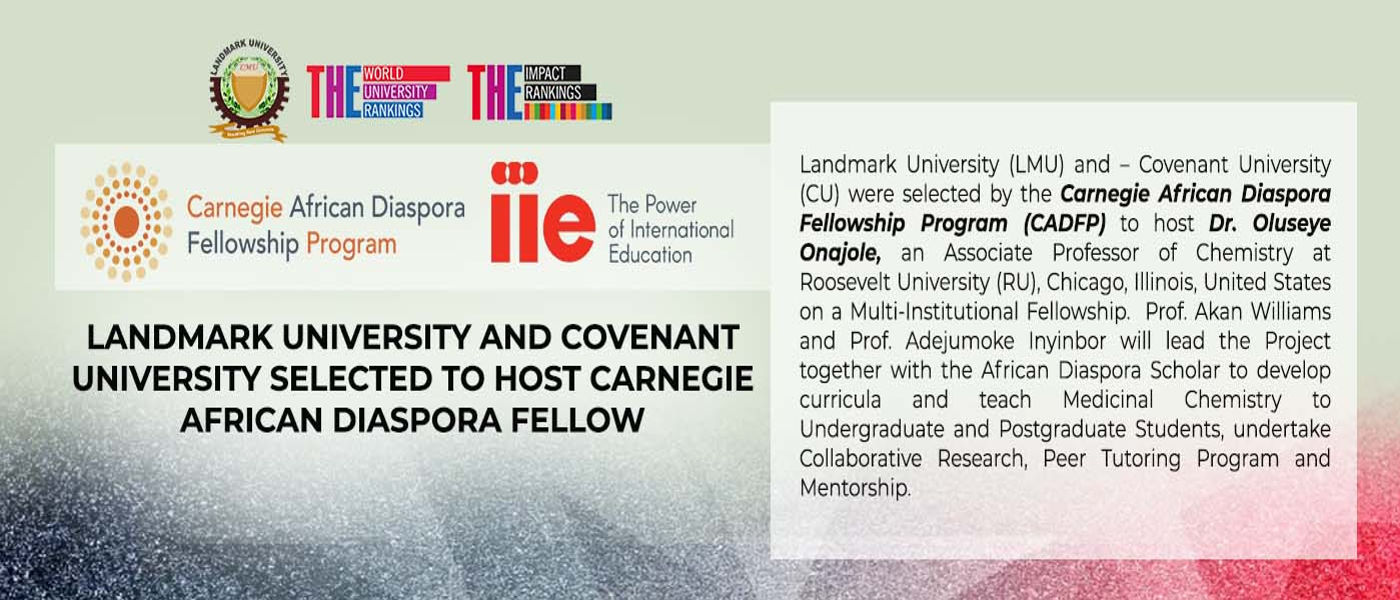LANDMARK UNIVERSITY AND COVENANT UNIVERSITY SELECTED TO HOST CARNEGIE AFRICAN DIASPORA FELLOW

Contact: Head, Corporate Affairs, Landmark University, hcpa@lmu.edu.ng; Prof. Adejumoke Inyinbor, inyinbor.adejumoke@lmu..edu.ng
Institute of International Education (IIE), AfricanDiaspora@iie.org Collaborative Project will focus on Medicinal Chemistry
Carnegie African Diaspora Fellowship Program (CADFP)
Collaborative Project will focus on Medicinal Chemistry
Carnegie African Diaspora Fellowship Program to Support Projects at Universities across Africa
Omu Aran, May 2, 2024 Landmark University (LMU) and – Covenant University (CU) were selected by the Carnegie African Diaspora Fellowship Program (CADFP) to host an African Diaspora scholar from the United States on a Multi-Institutional Fellowship to develop curricula and teach Medicinal Chemistry to Undergraduate and Postgraduate Students, undertake Collaborative Research, Peer Tutoring Program and Mentorship. Prof. Akan Williams and Prof. Adejumoke Inyinbor will lead the Project, together with Dr. Oluseye Onajole, an Associate Professor of Chemistry at Roosevelt University (RU), Chicago, Illinois, United States.
The Diaspora Fellow, Dr. Oluseye Onajole, will work collaboratively with the hosts at LMU and CU to develop curricula and teach undergraduate and postgraduate students “Introduction to Medicinal Chemistry” and “Advanced Medicinal Chemistry” onsite and virtually, from January 3 – February 7, 2025. The students will be exposed to retrosynthesis and synthesis of organic compounds including novel compounds, drug design and development, and will be given joint certificates by the collaborating universities. This will form the bases for offering Medicinal Chemistry as a Master’s degree option in the near future. The Fellow will share research experiences with postgraduate students and the Medicinal Chemistry and Drug discovery research group of the College of Pure and Applied Sciences as their research goals are related. He will establish Broth Microdilution Assay used in his laboratory to identify anti-microbial properties of new chemical entities (NCE). The Fellow’s research laboratory (OK Research Group) focuses on the design, synthesis and biological evaluation of novel chemical entities (NCE) as potential anti-tuberculosis agents, the design and synthesis of anti-malarial agents, Nuclear magnetic Resonance (NMR) elucidation (using 1D and 2D-NMR) of polycyclic compounds, and biological screening of selected novel compounds against Gram-positive and Gram-negative strains of bacteria while the Medicinal Chemistry and Drug Discovery Research group are indigenous African Scientists with skills in natural products isolation and synthesis of new therapeutics for malaria, cancer and safe food preservatives. There will be partnership with Dr. Onajole’s laboratory for the collection of spectroscopic data of synthesized or purified organic compounds sent from LMU and CU. The Fellow and collaborators will be involved in organizing seminars/workshops for students on how to prepare and write winning research/grant proposals. He will also expose the undergraduate students of the host universities to “Peer Tutoring Program”, establishing the “Science
Peer Tutoring Center” to cater for the needs of students in Chemistry, Biochemistry and Biology courses considered to be challenging. Outstanding students will be hired as peer tutors to mentor and train students taking the current courses. This is as coordinated by him at RU and an MoU is expected to be signed for a sustainable relationship with the host universities.
The Covenant University and Landmark University project is one of 60 projects that will pair African Diaspora scholars with higher education institutions and collaborators in Africa to work together on curriculum co-development, collaborative research, graduate training and mentoring activities in the coming months.
The CADFP, now in its tenth year, has developed long-term, mutually-beneficial collaborations between universities in Africa and the United States and Canada. It is funded by Carnegie Corporation of New York and managed by the Institute of International Education (IIE) in collaboration with the Association of African Universities (AAU). Nearly 650 African Diaspora Fellowships have now been awarded for scholars to travel to Africa since the program’s inception in 2013.
Fellowships match host universities with African-born scholars and cover the expenses for project visits of between 14 and 90 days, including transportation, a daily stipend, and the cost of obtaining visas and health insurance.
Please direct all questions related to the application process to AfricanDiaspora@iie.org.
